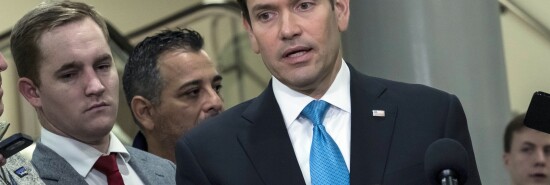
Why Marco Rubio is wrong about China
Dan Hannan
Video Embed
I don’t want to pick on Sen. Marco Rubio (R-FL). On the contrary, I have a soft spot for the former college football player who, though he is my age, has the looks, energy, and enthusiasm of a 35-year-old. The only time I properly met him, I found him utterly charming. I cite the former presidential hopeful only because he articulates a view that has very suddenly become orthodox among Republicans, and a view that I think is profoundly mistaken.
On Dec. 5, Florida’s senior senator spoke at a conference of the International Democracy Union, the global alliance of right-of-center parties. He didn’t say anything he hasn’t said before, but he neatly summarized the case for economic protectionism.
HOME ECONOMICS: THE ALTERNATIVE TO MORTGAGES WITH SKY-HIGH RATES
Free trade, he told us, was a Reagan-era policy that was not apt to modern conditions. China did not play fair. It demanded that investors go in with local partners and then reverse-engineered their products. It subsidized its manufacturers, sometimes directly, sometimes by giving them artificially cheap energy. The result was that America had closed factories, seen whole towns lost to opioid addiction, and become dependent on an unfriendly power for key products. What was the point of being the world’s largest economy without secure and well-paying jobs? The trouble, he concluded, was that China could get things done by simply promoting this or that industry, whereas the United States was slowed down by pork-barrel negotiations.
I hope I have summarized his argument fairly. At any rate, it won him a standing ovation from the 300 assembled parliamentarians. As I say, conservatives have been astonishingly quick to buy into this way of thinking. But almost every aspect of it struck me as incorrect.
First, the proposition that Chinese competition has destroyed jobs is false. The U.S. has seen a steady expansion in both jobs and pay packets. Working-class men earn a third more than their fathers did at the same age. We sometimes imagine that 1950s workers lived in a blue-collar golden age, but the hourly wage in a Detroit car factory in 1953 was $1.30, equivalent to $14.50 today, below the starting salary of an Amazon warehouse worker.
Sure, some jobs are lost to Chinese competition — critics say 130,000 a year. But that is a rounding error when we consider that 60 million jobs are lost each year (and more are created) through technology. Automation affects every country, including China, where manufacturing jobs have been in decline since 2013 because of robotics. Indeed, according to a 2017 study, the sectors exposed to Chinese competition have been creating jobs faster than others. Not factory jobs — better-paid jobs in design, research, and marketing.
When former President Donald Trump complains that “China is the biggest beneficiary of Apple, not us,” he is wrong. Most of the “Chinese” components in your iPhone were imported to China from elsewhere, not least the U.S. Chinese parts and labor account for less than 2% of the total price. Most of the profits come to the U.S.
As for violating rules, China has won more cases against the U.S. in the World Trade Organization than the reverse. And China has a better record than America in taking corrective action when it loses. If it wants growth, the U.S. should embrace global markets, not exclude China from them.
But the real flaw in Rubio’s analysis is the idea that China outperformed the West by state planning. China’s growth, as Ning Wang and Ronald Coase showed, began outside the surveillance of the authorities. In the 1970s, farmers started to privatize land, writing secret contracts. Then, they began to found small enterprises. By the 1980s, Deng Xiaoping, unable to halt the process, embraced it. Between 1978 and 2011, the proportion of the urban population employed by the state fell from 99% to 18%. China prospered, in other words, precisely because it abandoned central planning and was, as Deng put it, “crossing the river by stepping stone to stone.”
Chinese President Xi Jinping has reversed this process and returned to five-year plans. In consequence, investment has dried up. It would be crazy to imitate China’s current growth-killing strategy rather than the policies that led to its success before 2012.
CLICK HERE TO READ MORE FROM THE WASHINGTON EXAMINER
The trouble is that Rubio’s case, though inaccurate, is intuitive. Most people think that making stuff is more valuable than offering services; that growth in another country is a threat, not a boon; that jobs are a benefit rather than a cost (or, more accurately, a means to the end of greater prosperity); and that things were better in the good old days.
I remember when Rubio blamed his defeat in the 2016 primaries on being too optimistic. Sadly, the Right as a whole has since descended into grumpiness.
